Virus masks, apps: The race is on to avoid hidden carriers
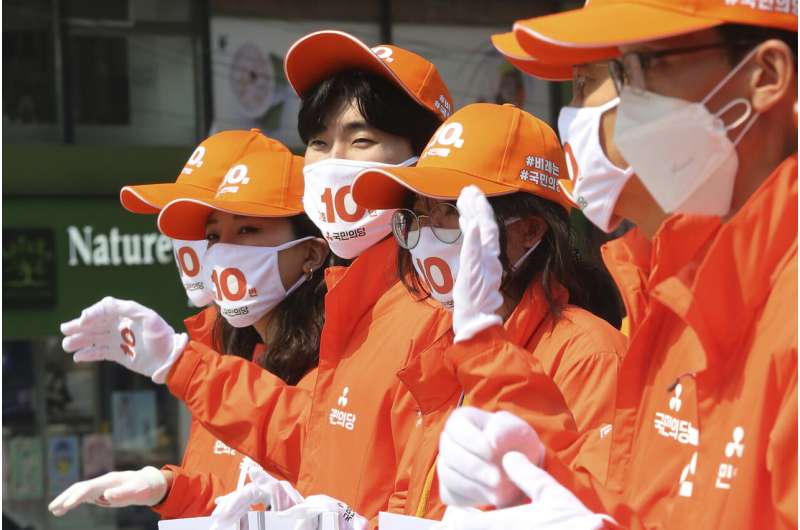
The worldwide race to protect people against being infected by unwitting coronavirus carriers intensified Thursday, pitting governments against each other as they buy protective gear and prompting new questions about who should wear masks, get temperature checks or even be permitted to go outside.
In the Chinese city of Wuhan, where the pandemic began in December, a green symbol on residents' smartphones dictates their movements. Green is the "health code" that says a user is symptom-free. It's required to board a subway, check into a hotel or enter the central city of 11 million. Serious travel restrictions still exist for those who have yellow or red symbols.
In northern Italy, the country with the most virus deaths in the world at over 13,000, guards with thermometer guns decide who can enter supermarkets. In Los Angeles, the mayor has recommended that the city's 4 million people wear masks. They're mandatory for all Israelis who leave home, as well as customers of grocery stores in Austria and pharmacies in Pakistan.
A top official in France's hard-hit eastern region complained Thursday that American officials swooped in at a Chinese airport to spirit away a planeload of masks that France had ordered.
"On the tarmac, the Americans arrive, take out cash and pay three or four times more for our orders, so we really have to fight," Dr. Jean Rottner, president of the Grand Est regional council and an emergency room physician in Mulhouse, told RTL radio.
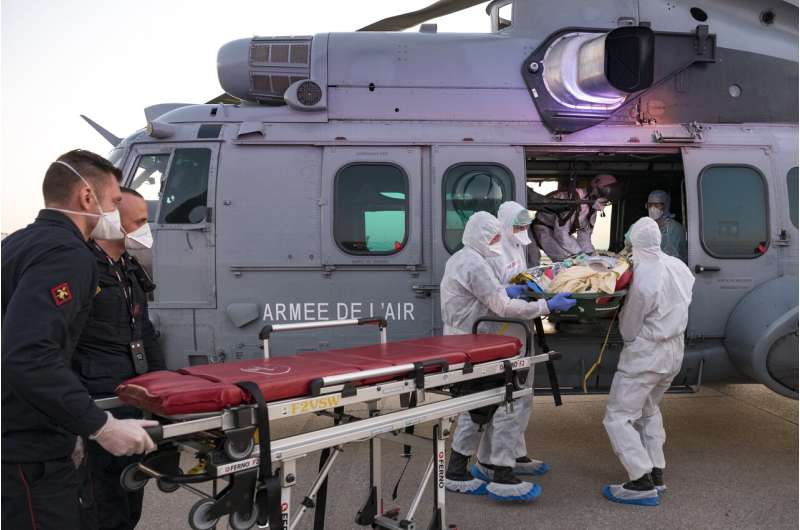
A study by researchers in Singapore on Wednesday estimated that around 10% of new infections may be sparked by people who carry the virus but have no symptoms yet or never do.
In Greece, authorities placed an entire refugee camp of 2,400 people under quarantine Thursday after discovering that a third of the 63 contacts of just one infected woman tested positive—and none had showed symptoms.
The top U.S. infectious disease official, Dr. Anthony Fauci, said medical experts are no closer to figuring out why some seemingly healthy people have only mild or no symptoms while others become catastrophically sick.
"I've been doing infectious diseases now for almost 50 years, and I can tell you I don't fully understand exactly what the mechanism of that is," he told NBC's "Today" show.
In response to the study, the U.S. Centers for Disease Control and Prevention changed how it defined the risks of infection, saying essentially that anyone may be a carrier, whether they have symptoms or not. But neither it nor the World Health Organization changed their recommendations that not everyone need to wear a mask.
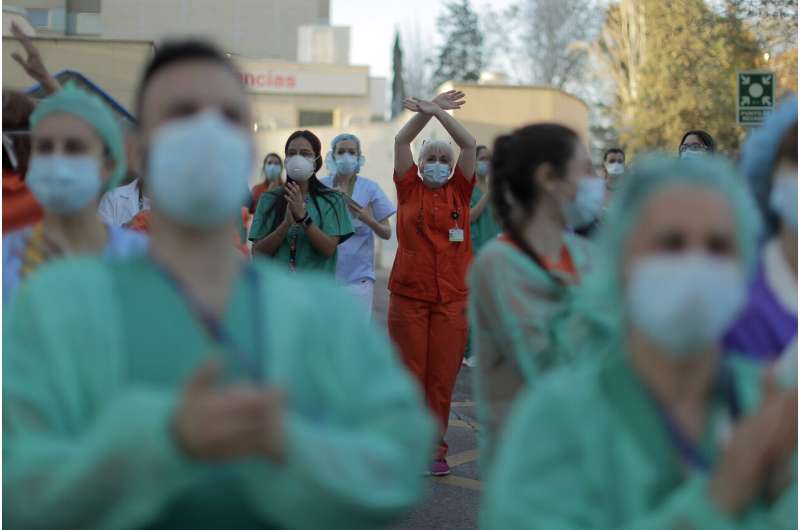
Los Angeles Mayor Eric Garcetti said even a "tucked-in bandanna" could slow the spread of the virus and remind people to keep their distance from each other.
"We're going to have to get used to seeing each other like this," he said, donning a mask.
In Japan, where masks are a household staple, the government planned to mail two gauze masks each to the country's 50 million households.
Nine leading European university hospitals warned Thursday they will run out of essential medicines for COVID-19 patients in intensive care in less than two weeks. The European University Hospital Alliance said countries should cooperate, not compete and refuse to export drugs elsewhere, to ensure a steady supply of these drugs for critically ill virus patients.
They wrote that existing stocks of muscle relaxants, sedatives and painkillers were likely to run out in two days in the hardest-hit hospitals, and in two weeks in others. The group represented hospitals in Austria, Britain, France, Germany, Italy, the Netherlands, Belgium, Sweden and Spain.
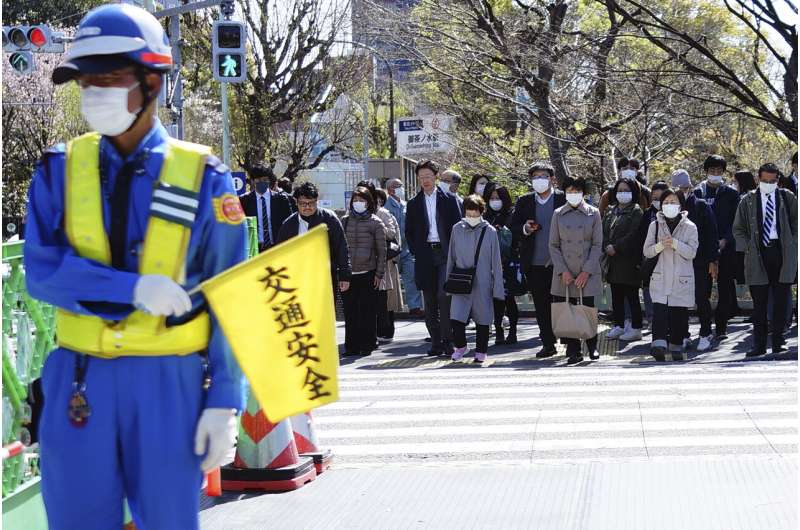
In the United States, from New York to Los Angeles, officials also warned that the worst is still ahead.
"How does it end?" New York Gov. Andrew Cuomo said. "The answer is nobody knows for sure."
New York state's coronavirus death toll doubled in 72 hours to more than 1,900. Cuomo has already complained that U.S. states are competing against each other for protective gear and breathing machines, or being outbid by the federal government.
President Donald Trump acknowledged that the federal stockpile is nearly depleted of the personal protective equipment needed to protect doctors and nurses on the front lines of the coronavirus fight. The Pentagon said Thursday that the Federal Emergency Management Agency had asked it to help by sending 100,000 body bags.
Altogether, more than 956,000 people around the world have contracted the virus, according to Johns Hopkins University. More than 48,000 have died from the virus and another 202,000 have recovered.
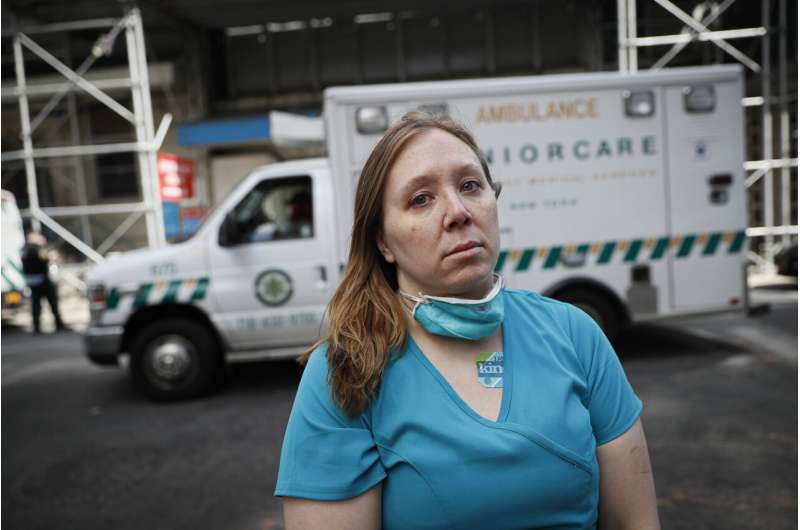
The real figures are believed to be much higher because of testing shortages, differences in counting the dead and mild cases that have gone unreported. The virus, which is spread by tiny droplets from sneezes or coughs. causes mild or moderate symptoms in most people but can cause severe illness and death for the elderly or the ill.
Many governments are modeling their response to the virus after China, which in January closed off an entire province of over 70 million. People in Wuhan, once the epicenter of the crisis, are starting to return to work, tracked by a smartphone app.
Walking into a subway station, Wu Shenghong, used her phone to scan a barcode on a poster that triggered her app. A green code and part of her identity card number appeared on the screen and a guard wearing a mask and goggles waved her through.
-
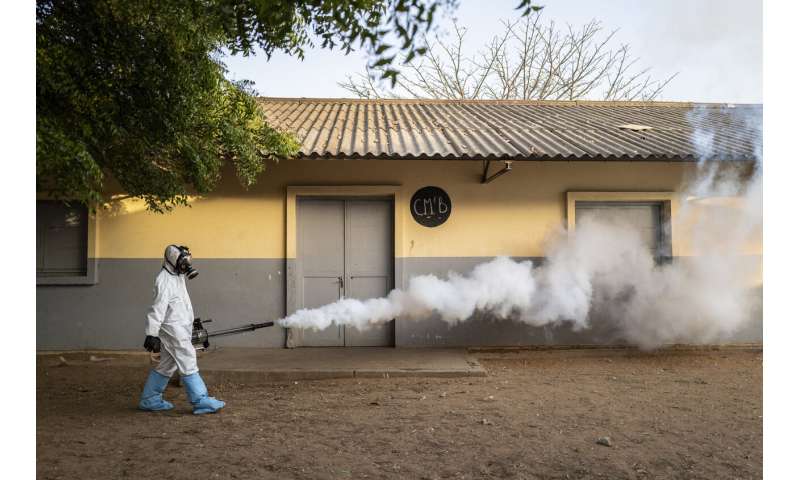
In this Wednesday, April 1, 2020, photo, a municipal worker sprays disinfectant at a school to help curb the spread of the new coronavirus in Dakar, Senegal. The new coronavirus causes mild or moderate symptoms for most people, but for some, especially older adults and people with existing health problems, it can cause more severe illness or death. (AP Photo/Sylvain Cherkaoui) -
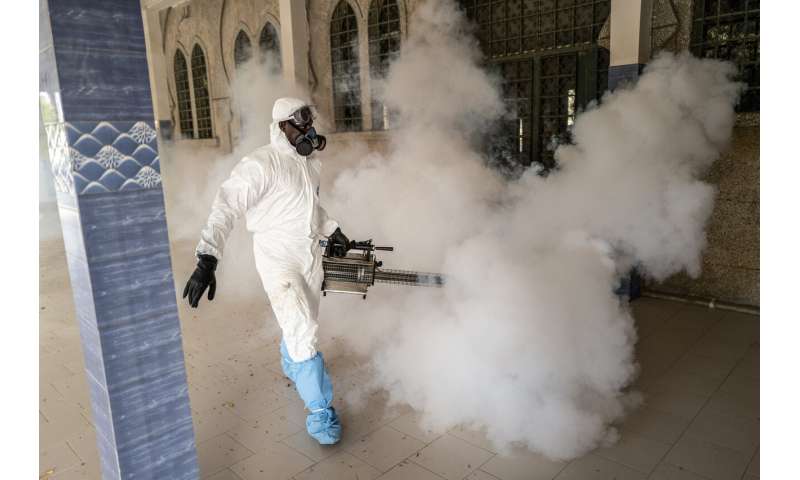
In this Wednesday, April 1, 2020, photo, a municipal worker sprays disinfectant in a mosque to help curb the spread of the new coronavirus in Dakar, Senegal. The new coronavirus causes mild or moderate symptoms for most people, but for some, especially older adults and people with existing health problems, it can cause more severe illness or death. (AP Photo/Sylvain Cherkaoui) -
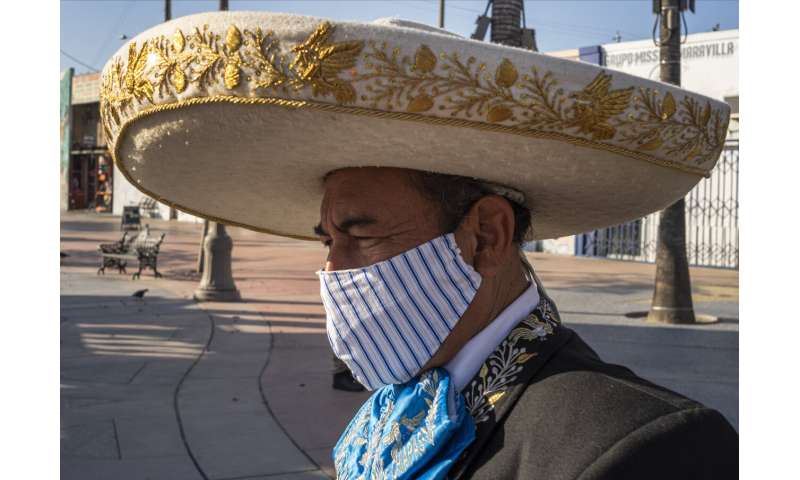
Mariachi player Aurelio Reyes wears a homemade face mask, before playing at El Mariachi Plaza in the Boyle Heights area of Los Angeles on Wednesday, April 1, 2020. Los Angeles Mayor Eric Garcetti has recommended that the city's 4 million people wear masks when going outside amid the spreading coronavirus. Garcetti on Wednesday said people in the nation's second-largest city who are performing essential tasks such as food shopping should wear homemade, non-medical face coverings, or even bandannas. (AP Photo/Damian Dovarganes) -
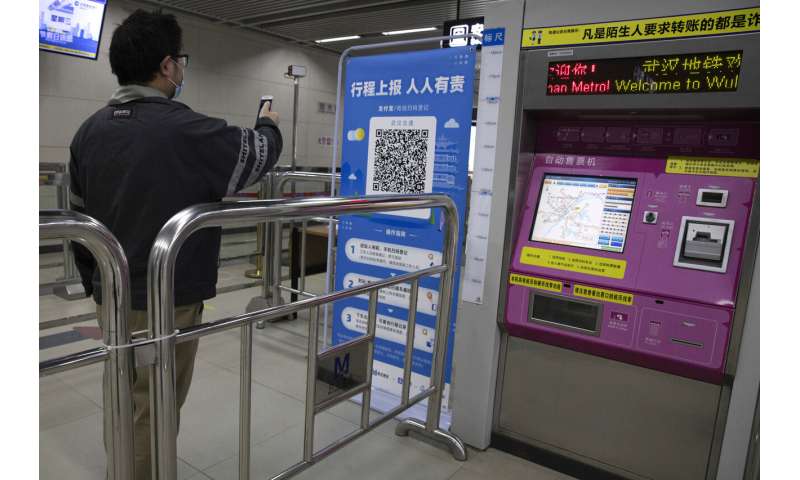
In this April 1, 2020 photo, a passenger scans a QR code to get his green pass at a subway station in Wuhan in central China's Hubei province. Life in China post-coronavirus outbreak is ruled by a green symbol on a smartphone screen. Green signifies the "health code" that says the user is symptom-free. It is required to board a subway, check into a hotel or enter Wuhan, the city where the global pandemic began. (AP Photo/Ng Han Guan) -
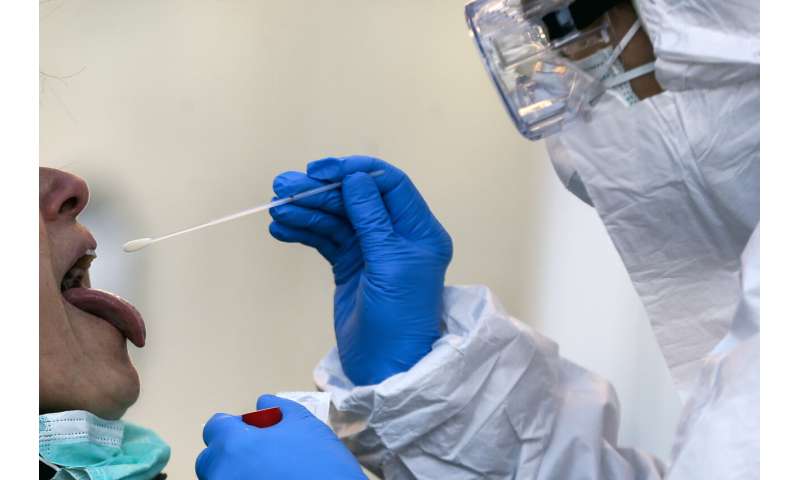
Medical staff of a mobile unit take samples from a woman to test for Covid-19, at the Santa Maria della Pieta' hospital complex, in Rome, Wednesday, April 1, 2020. The new coronavirus causes mild or moderate symptoms for most people, but for some, especially older adults and people with existing health problems, it can cause more severe illness or death. (Cecilia Fabiano/LaPresse via AP) -
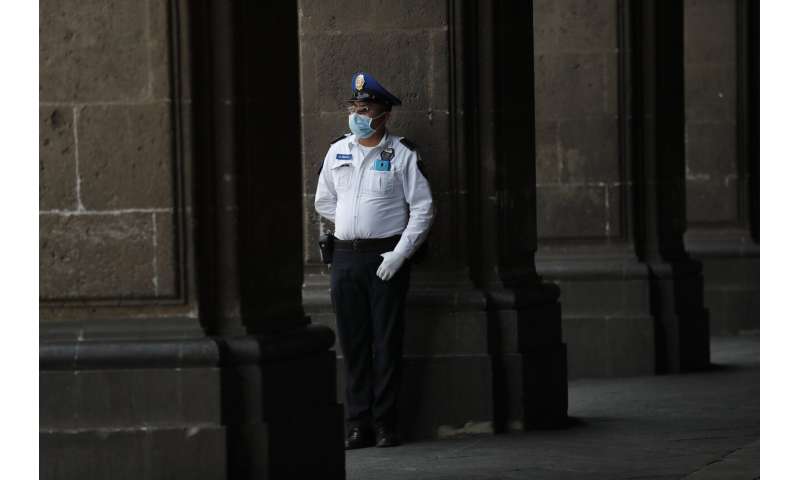
A police officer wearing protective gear against the spread of the new coronavirus, stands guard outside the mayor's office, in the historic center of Mexico City, Wednesday, April 1, 2020, where many businesses have temporarily closed. Mexico's government has broadened its shutdown of "non essential activities," and prohibited gatherings of more than 50 people as a way to help slow down the spread of COVID-19. (AP Photo/Marco Ugarte) -
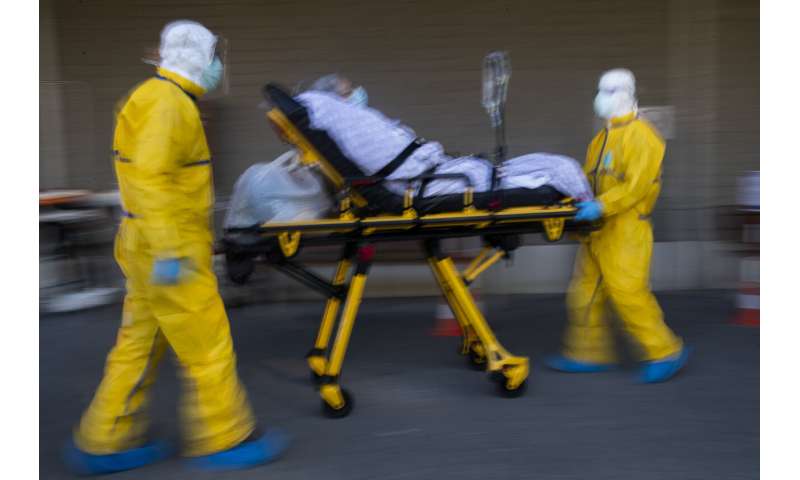
A coronavirus patient is transferred from a hospital that was full to capacity to another hospital by members of the medical staff of Klinicare in Brussels, Wednesday, April 1, 2020. The new coronavirus causes mild or moderate symptoms for most people, but for some, especially older adults and people with existing health problems, it can cause more severe illness or death. (AP Photo/Francisco Seco) -
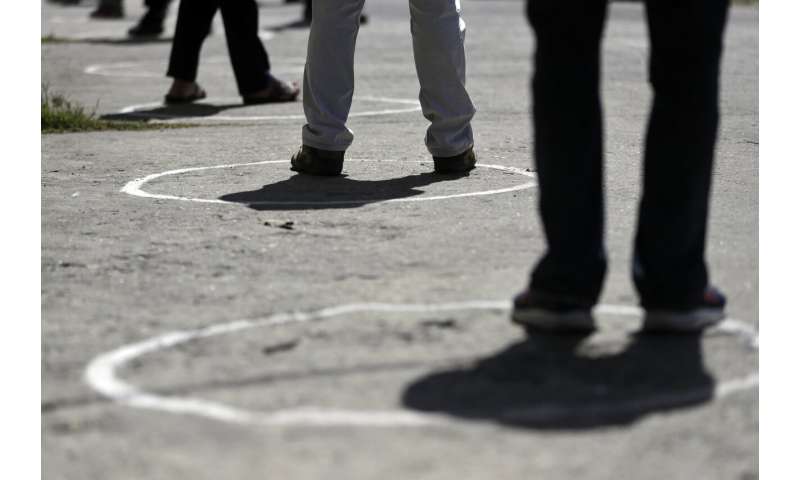
Nepalese people maintain social distance as they wait to buy daily groceries at fair priced shops opened by government during lockdown in Kathmandu, Nepal, Thursday, April 2, 2020. The new coronavirus causes mild or moderate symptoms for most people, but for some, especially older adults and people with existing health problems, it can cause more severe illness or death. (AP Photo/Niranjan Shrestha) -
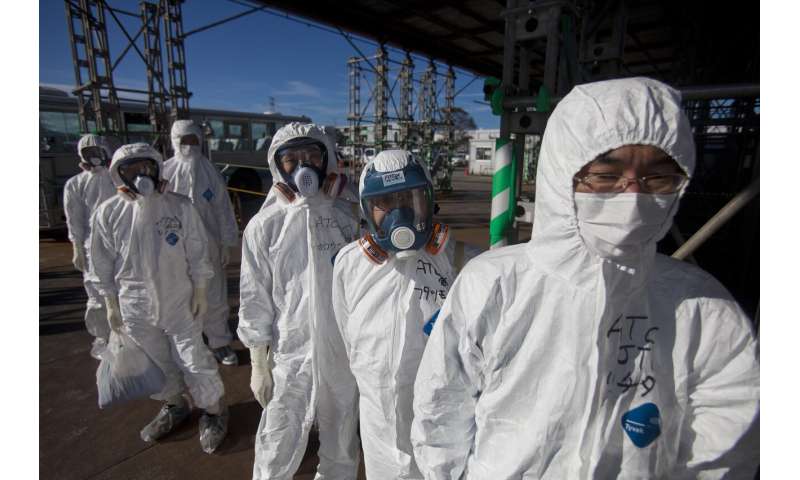
This Nov. 12, 2011, file photo, shows workers in protective suits and masks as they wait to enter the emergency operation center at the crippled Fukushima Dai-ichi nuclear power station in Okuma, Japan. The shortage of protective gear caused by the coronavirus pandemic has hit the workers at the meltdown-hit Fukushima nuclear plant in Japan, where they've needed them daily for years to guard against radiation. Shipments temporarily stopped coming in, although an alternative supplier was later found, according to Tokyo Electric Power Co., the utility that runs Fukushima Dai-ichi. (AP Photo/David Guttenfelder, File) -
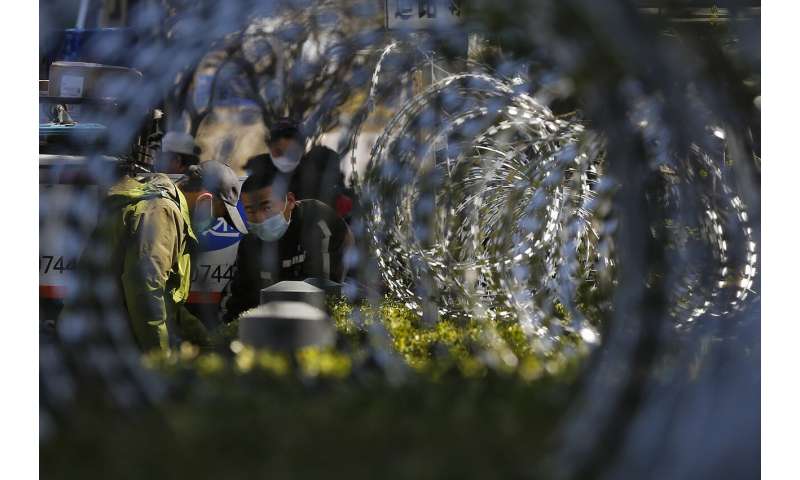
Resident wearing protective face masks collect their goods from the delivery workers near the barbed wire installed outside residential apartment buildings to prevent outsider from entering amid the outbreak of the new coronavirus in Beijing, Thursday, April 2, 2020. China says a chartered flight is currently bound for London to pick up a group of Chinese international students who have struggled to return home as COVID-19 spreads around the world. (AP Photo/Andy Wong) -

In this photo provided by the French Army Thursday, April 2, 2020, medical staffs evacuate a patient infected with the Covid-19 virus, Wednesday April 1, 2020 at Orly airport, south of Paris. The operation aims at relieving hospitals in the Paris region, hardly hit by the coronavirus. The new coronavirus causes mild or moderate symptoms for most people, but for some, especially older adults and people with existing health problems, it can cause more severe illness or death. (Julien Fechter/DICOD via AP) -
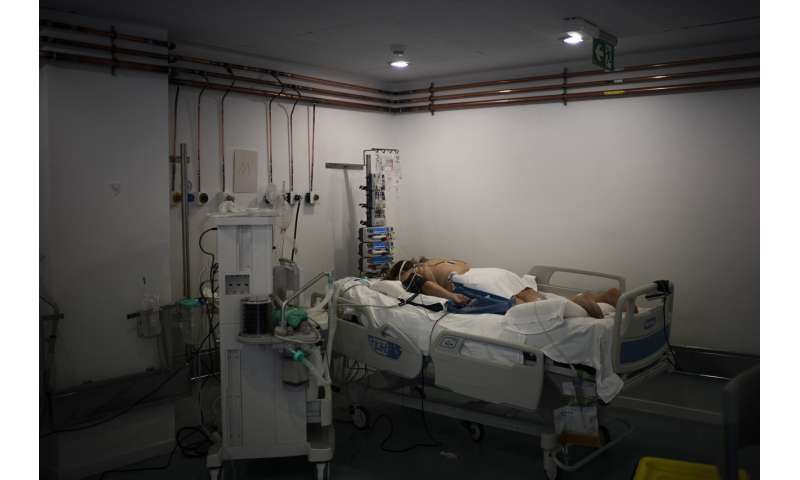
A COVID-19 patient undergoes treatment at a library that was turned into an intensive care unit (ICU) at German Trias i Pujol hospital in Badalona, Barcelona province, Spain, Wednesday, April 1, 2020. The new coronavirus causes mild or moderate symptoms for most people, but for some, especially older adults and people with existing health problems, it can cause more severe illness or death. (AP Photo/Felipe Dana) -
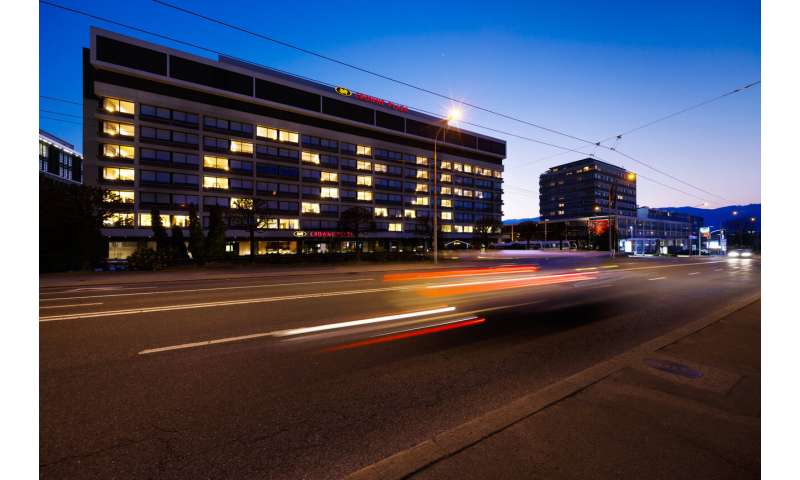
The word LOVE is spelled with the lighting in the rooms of an almost entirely empty hotel in Geneva, Switzerland, Wednesday, April 1, 2020 sending a message of positivity during the global coronavirus outbreak. For most people, the new coronavirus causes only mild or moderate symptoms. For some it can cause more severe illness. (Valentin Flauraud/Keystone via AP) -
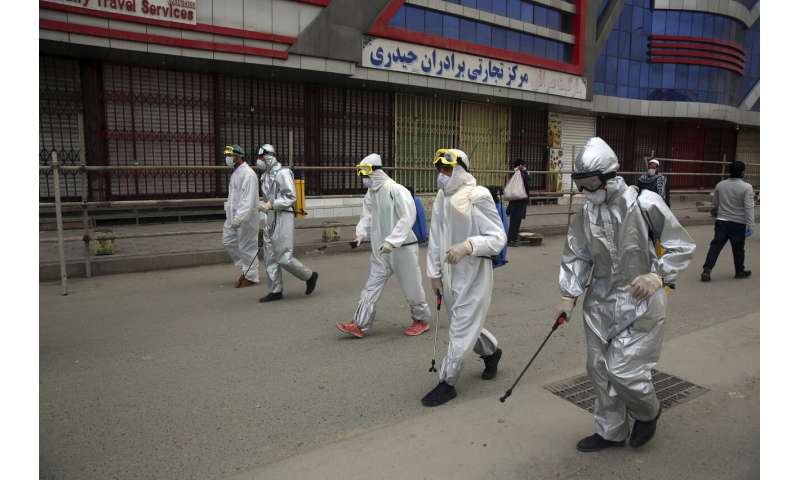
In this March 29, 2020, file photo volunteers in protective suits spray disinfectant on storefronts to help curb the spread of the coronavirus in Kabul, Afghanistan. Both the Islamic State group and al-Qaida see the global upheaval caused by the new coronavirus as a threat but also as an opportunity to strike harder than before, asserting that the virus is punishment for non-Muslims while also urging followers to repent and take care of themselves. (AP Photo/Rahmat Gul, File)
A red code could have told the guard that Wu was infected or had symptoms and was awaiting a diagnosis. A yellow code means she had contact with an infected person but hadn't finished a two-week quarantine.
People with red or yellow codes "are definitely not running around outside," said Wu, 51. "I feel safe."
© 2020 The Associated Press. All rights reserved. This material may not be published, broadcast, rewritten or redistributed without permission.




















